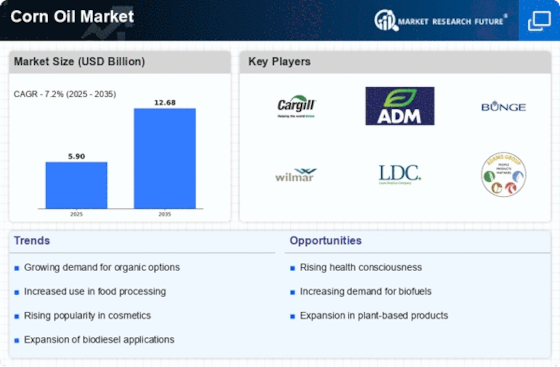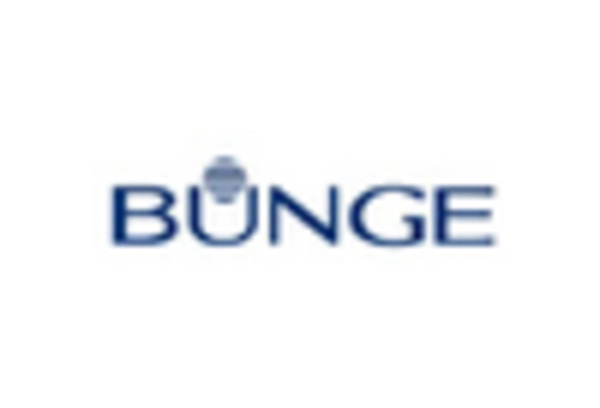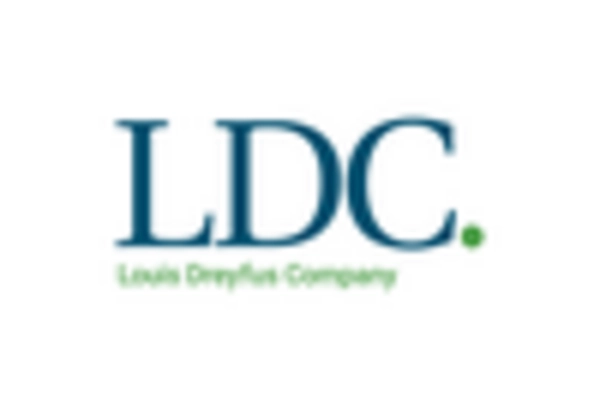Market Share
Introduction: Navigating Competitive Dynamics in the Corn Oil Market
The corn oil market is in a state of transition, influenced by rapid technological progress and changing consumer tastes. As a result, agribusinesses, specialty oil manufacturers and start-ups are vying for market leadership with a focus on product differentiation and supply chain efficiencies. The use of artificial intelligence (AI) and the Internet of Things (IoT) is enabling companies to optimize their production processes and improve traceability. Meanwhile, regulatory changes are encouraging companies to adopt greener production methods and greater transparency in their supply chains. These trends are driving growth in North America and Asia-Pacific, where the demand for healthier and more sustainable products is on the rise. Strategically deploying automation and green initiatives will be critical to companies wishing to respond to these trends.
Competitive Positioning
Full-Suite Integrators
These vendors offer comprehensive solutions across the corn oil value chain, from production to distribution.
| Vendor | Competitive Edge | Solution Focus | Regional Focus |
|---|---|---|---|
| Archer-Daniels-Midland Company | Extensive supply chain network | Agricultural processing and ingredients | Global |
| Cargill Inc | Diverse product portfolio | Food ingredients and agricultural services | Global |
| Associated British Foods | Strong brand presence | Food production and ingredients | Global |
Specialized Technology Vendors
These companies focus on innovative technologies and solutions tailored for the corn oil market.
| Vendor | Competitive Edge | Solution Focus | Regional Focus |
|---|---|---|---|
| Ingredion Incorporated | Advanced ingredient solutions | Food and beverage ingredients | North America, South America, Asia |
| Roquette Frères | Expertise in plant-based ingredients | Food and pharmaceutical ingredients | Global |
Infrastructure & Equipment Providers
These vendors supply essential equipment and infrastructure for corn oil production and processing.
| Vendor | Competitive Edge | Solution Focus | Regional Focus |
|---|---|---|---|
| Grain Processing Corporation | Specialized processing technology | Corn processing and ingredients | North America |
| Greenfield Specialty Alcohols | Sustainable production methods | Specialty alcohols and derivatives | North America |
| Richardson International | Integrated supply chain | Grain handling and processing | Canada, United States |
| Bluecraft Agro | Focus on agricultural innovation | Agro-based products | Asia, Africa, Middle East |
| Abu Dhabi Vegetable Oil Company LLC | Regional market expertise | Vegetable oil production | Middle East |
Emerging Players & Regional Champions
- Green Fields Oil (USA): Specializes in organic and non-GMO corn oil products, recently secured a contract with a major health food retailer, challenging established vendors by focusing on sustainability and health-conscious consumers.
- AgroTech Innovations (Brazil): Offers advanced extraction technologies for corn oil, recently implemented a pilot project with local farmers to enhance yield and quality, complementing traditional methods and providing a competitive edge.
- Pure Corn Solutions (India): Focuses on affordable corn oil for the mass market, recently partnered with regional distributors to expand reach, challenging premium brands by offering cost-effective alternatives.
- EcoCorn Oils (Canada): Provides eco-friendly packaging solutions for corn oil, recently launched a campaign promoting sustainability, complementing established vendors by appealing to environmentally conscious consumers.
Regional Trends: In 2024, a notable trend toward organic and sustainable corn oil products, especially in North America and Europe, is a result of the demand for a healthier diet. In emerging markets such as Brazil and India, a focus on local production and a more affordable price are also key. As a result, specialization in extraction methods is increasing, resulting in improved quality and greater efficiency.
Collaborations & M&A Movements
- Cargill and Archer Daniels Midland Company (ADM) entered into a joint venture to enhance their corn oil production capabilities, aiming to capture a larger share of the growing demand for plant-based oils in the food industry.
- Bunge Limited acquired a minority stake in a startup focused on sustainable corn oil extraction technologies, positioning itself to lead in eco-friendly oil production amidst increasing regulatory pressures for sustainability.
- Wilmar International partnered with a local agricultural cooperative to improve corn oil supply chain efficiencies, thereby strengthening their competitive positioning in the Asian market where demand for corn oil is surging.
Competitive Summary Table
| Capability | Leading Players | Remarks |
|---|---|---|
| Sustainability | Cargill, Archer Daniels Midland (ADM) | Cargill has implemented advanced sustainable farming practices, reducing carbon emissions by 30% in their corn oil production. ADM has invested in renewable energy sources for their processing plants, showcasing a commitment to sustainability. |
| Product Quality | Bunge, Wilmar International | In the production of corn oil, Bunge makes use of the latest refining technology. This has won it a number of quality awards. The quality of the product is always consistent, and meets the highest international standards. |
| Supply Chain Efficiency | Cargill, Bunge | Cargill has optimized its supply chain through digital tracking systems, reducing lead times by 20%. Bunge employs a robust logistics network that enhances their distribution capabilities, ensuring timely delivery to clients. |
| Innovation in Product Development | ADM, Wilmar International | ADM has launched a new line of non-GMO corn oil products, catering to health-conscious consumers. Wilmar International is known for its innovative blends of corn oil with other oils, enhancing nutritional profiles and market appeal. |
| Market Reach | Cargill, ADM | Cargill has a vast global distribution network, allowing them to penetrate emerging markets effectively. ADM leverages strategic partnerships to expand its market presence, particularly in Asia and Africa. |
Conclusion: Navigating the Corn Oil Market Landscape
The Corn Oil market is highly fragmented and is characterized by a large number of players. This is primarily because of the growing trend of consumers to prefer products derived from sustainable sources. The major players are mainly based on their distribution networks and brand loyalty. The new players are focusing on innovation and technology, especially in the field of artificial intelligence and automation, to capture niche markets. Competition will be fiercer in the future. The leading companies will be those with strong capabilities in the areas of sustainability and flexible operations, which can quickly respond to changes in consumer preferences and regulatory landscapes. Strategic investment in these areas will be critical to maintaining a competitive edge and achieving long-term success.


















Leave a Comment